Style is the Heart of Creativity: Pf. Seán M. O’Connor’s Talk on AI-generated Music and Copyright
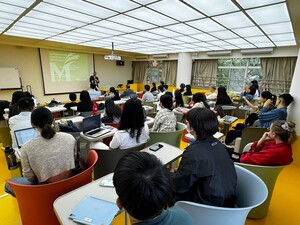
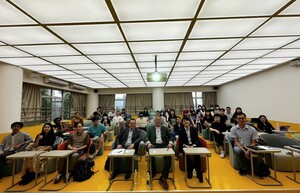
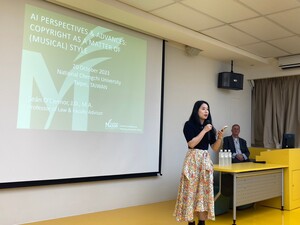

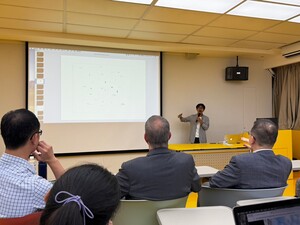
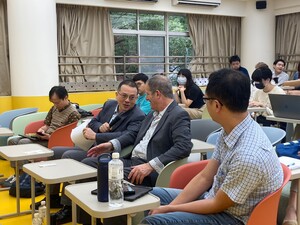
Date :
2023-11-15
Department :
International Master's Program in International Communication Studies
【Article by IMICS】
On October 20th, Media Entertainment Law, an IMICS course has the honor to invite Professor Seán M. O’Connor to give students a 90-minute lecture. Hosted by pf. Jesse Lu, the lecture attracted over 30 students from College of Communication, Law and more.
Professor O’Connor is a Professor of Law at George Mason University, as well as Editor of The Oxford Handbook of Music Law & Policy and of 5G and Beyond: Intellectual Property and Competition Policy in the Internet of Things. Largely focused on intellectual property and business law for commercializing innovation in technology and arts, pf. O’Connor shares his insights with the topic “AI Perspectives & Advances: Copyright as a Matter of Music Style.” The lecture took place at the beautifully renovated venue Li Zhan Lecture Hall in NCCU Communication Building. And the talk was initiated with a warm welcome from pf. Tammy Lin, Director of IMICS.
Pf. O’Connor first talked about basic music copyright, which distinguishes ownership between composition and sound recordings. Compositions are typically owned by the composer, while sound recordings, embodied in a physical object like a phonorecording, are owned by the record label. However, modern music creation has evolved with the involvement of AI, making the process more complex and exciting. Music is now composed, performed, and recorded holistically using digital audio workstations (DAWs) and synthesizers.
The lecture then covered the nature of AI-generated music. AI's involvement in music creation has blurred the lines of authorship and copyright, leading to the need to protect the rights and interests of human artists. Upon discussing how to compensate and reward human artists, “style” is brought up and might be a crucial part of the debate as pf. O’Connor mentioned.
A major part of this lecture delved into the concept of style in music. "Performative style" refers to how a performer delivers and interprets a musical work, while "compositional style" involves the unique style of a composer. It was emphasized that individuals who can distinguish between various artists' styles are an essential part of the music industry, as people often seek to replicate "the style" they admire. Pf. O’Connor provided examples with AI generated music “in …. musician’s style” where the artists mentioned were not involved in the production at all. As the artists were not shown in the music, their styles were recognizable and derived in the AI works.
Pf. O’Connor then explored legal regimes available to protect musical productions. It considered the question of what should be considered as AI's authorship and how much human involvement should be required in AI-generated music. AI outputs often blend and mimic existing styles, and it was noted that some level of “copying” is necessary for AI machine learning. Although the learning materials are often licensed to be displayed online, it is debatable whether the author have agreed to license their works for machine learning and whether these can be considered fair use.
A significant point of discussion was whether the style itself should be protected. The lecture referenced cases like photographer Andy Warhol's work, highlighting how AI can quantify and replicate artistic style. Protecting style was deemed important, as it is considered the heart of creativity. However, it was suggested that when protecting compositional style, it should be narrowly defined to identify the individual composer's specific style without capturing broader aspects of a genre. This distinction is crucial in maintaining a balance between protecting artists' rights and encouraging artistic innovation.
After the talk, panelists echoed and shared more of their idea considering music copyright. Pf. Chieh-Ting Hsieh from College of Communication shared from a musical perspective. He talked about Beethoven’s advocacy for originality and independence by selling his music sheets, as well as shared cultural and artistic variations of notations for composition, bringing in a lot of space to interpret and perform music based on basic indication. Pf. Chung-Lun Shen from College of Law also raised questions upon commercial music becoming standardized, and compulsory licensing, bringing further discussions to a deeper level.
One and a half hour was certainly not enough to cover the complexity and depth of modern music copyright and Artificial intelligence. Professor O’Connor and students all hope there will be opportunities in the future to share more of his experience and exchange ideas with Taiwanese scholars and students.
On October 20th, Media Entertainment Law, an IMICS course has the honor to invite Professor Seán M. O’Connor to give students a 90-minute lecture. Hosted by pf. Jesse Lu, the lecture attracted over 30 students from College of Communication, Law and more.
Professor O’Connor is a Professor of Law at George Mason University, as well as Editor of The Oxford Handbook of Music Law & Policy and of 5G and Beyond: Intellectual Property and Competition Policy in the Internet of Things. Largely focused on intellectual property and business law for commercializing innovation in technology and arts, pf. O’Connor shares his insights with the topic “AI Perspectives & Advances: Copyright as a Matter of Music Style.” The lecture took place at the beautifully renovated venue Li Zhan Lecture Hall in NCCU Communication Building. And the talk was initiated with a warm welcome from pf. Tammy Lin, Director of IMICS.
Pf. O’Connor first talked about basic music copyright, which distinguishes ownership between composition and sound recordings. Compositions are typically owned by the composer, while sound recordings, embodied in a physical object like a phonorecording, are owned by the record label. However, modern music creation has evolved with the involvement of AI, making the process more complex and exciting. Music is now composed, performed, and recorded holistically using digital audio workstations (DAWs) and synthesizers.
The lecture then covered the nature of AI-generated music. AI's involvement in music creation has blurred the lines of authorship and copyright, leading to the need to protect the rights and interests of human artists. Upon discussing how to compensate and reward human artists, “style” is brought up and might be a crucial part of the debate as pf. O’Connor mentioned.
A major part of this lecture delved into the concept of style in music. "Performative style" refers to how a performer delivers and interprets a musical work, while "compositional style" involves the unique style of a composer. It was emphasized that individuals who can distinguish between various artists' styles are an essential part of the music industry, as people often seek to replicate "the style" they admire. Pf. O’Connor provided examples with AI generated music “in …. musician’s style” where the artists mentioned were not involved in the production at all. As the artists were not shown in the music, their styles were recognizable and derived in the AI works.
Pf. O’Connor then explored legal regimes available to protect musical productions. It considered the question of what should be considered as AI's authorship and how much human involvement should be required in AI-generated music. AI outputs often blend and mimic existing styles, and it was noted that some level of “copying” is necessary for AI machine learning. Although the learning materials are often licensed to be displayed online, it is debatable whether the author have agreed to license their works for machine learning and whether these can be considered fair use.
A significant point of discussion was whether the style itself should be protected. The lecture referenced cases like photographer Andy Warhol's work, highlighting how AI can quantify and replicate artistic style. Protecting style was deemed important, as it is considered the heart of creativity. However, it was suggested that when protecting compositional style, it should be narrowly defined to identify the individual composer's specific style without capturing broader aspects of a genre. This distinction is crucial in maintaining a balance between protecting artists' rights and encouraging artistic innovation.
After the talk, panelists echoed and shared more of their idea considering music copyright. Pf. Chieh-Ting Hsieh from College of Communication shared from a musical perspective. He talked about Beethoven’s advocacy for originality and independence by selling his music sheets, as well as shared cultural and artistic variations of notations for composition, bringing in a lot of space to interpret and perform music based on basic indication. Pf. Chung-Lun Shen from College of Law also raised questions upon commercial music becoming standardized, and compulsory licensing, bringing further discussions to a deeper level.
One and a half hour was certainly not enough to cover the complexity and depth of modern music copyright and Artificial intelligence. Professor O’Connor and students all hope there will be opportunities in the future to share more of his experience and exchange ideas with Taiwanese scholars and students.
